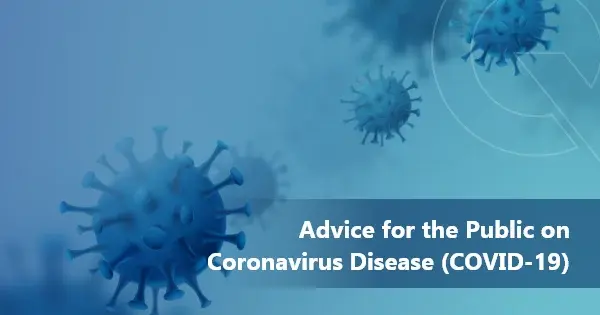 There are detailed instructions in various websites. We are focusing on three important areas where specific guidelines have been issued by WHO and CDC. These are as follows:
There are detailed instructions in various websites. We are focusing on three important areas where specific guidelines have been issued by WHO and CDC. These are as follows:
(a)Myths and incorrect information: Myth busters
(b)When and how to use masks
(c)Disinfecting your home if someone is sick.
Few facts
- The new coronavirus is a respiratory virus which spreads primarily through droplets generated when an infected person coughs or sneezes, or through droplets of saliva or discharge from the nose.
- To protect yourself, clean your hands frequently with an alcohol-based hand rub or wash them with soap and water.
- By doing this you eliminate viruses that may be on your hands and avoid infection that could occur by then touching your eyes, mouth, and nose.
- Also, avoid close contact with anyone who is coughing and sneezing.
Myth busters
COVID-19 virus can be transmitted in areas with hot and humid climates
- From the evidence so far, the COVID-19 virus can be transmitted in ALL AREAS, including areas with hot and humid weather.
- Regardless of climate, adopt protective measures if you live in, or travel to an area reporting COVID-19.
Cold weather and snow CANNOT kill the new coronavirus.
- There is no reason to believe that cold weather can kill the new coronavirus or other diseases.
- The normal human body temperature remains around 36.5°C to 37°C, regardless of the external temperature or weather.
- Taking a hot bath will not prevent you from catching COVID-19.
- Actually, taking a hot bath with extremely hot water can be harmful, as it can burn you.
The new coronavirus CANNOT be transmitted through mosquito bites.
- To date there has been no information nor evidence to suggest that the new coronavirus could be transmitted by mosquitoes.
Are hand dryers effective in killing the new coronavirus?
- Hand dryers are not effective in killing the 2019-nCoV.
- Once your hands are cleaned, you should dry them thoroughly by using paper towels or a warm air dryer.
Can an ultraviolet disinfection lamp kill the new coronavirus?
- Coronavirus disease UV lamps should not be used to sterilize hands or other areas of skin as UV radiation can cause skin irritation
How effective are thermal scanners in detecting people infected with the new coronavirus?
- Thermal scanners are effective in detecting people who have developed a fever (i.e. have a higher than normal body temperature) because of infection with the new coronavirus.
- However, they cannot detect people who are infected but are not yet sick with fever. This is because it takes between 2 and 10 days before people who are infected become sick and develop a fever.
Can spraying alcohol or chlorine all over your body kill the new coronavirus?
- Spraying alcohol or chlorine all over your body will not kill viruses that have already entered your body.
- Spraying such substances can be harmful to clothes or mucous membranes (i.e. eyes, mouth).
- Be aware that both alcohol and chlorine can be useful to disinfect surfaces, but they need to be used under appropriate recommendations.
Do vaccines against pneumonia protect you against the new coronavirus?
- Vaccines against pneumonia, such as pneumococcal vaccine and Haemophilus influenza type B (Hib) vaccine, do not provide protection against the new coronavirus.
- The virus is so new and different that it needs its own vaccine. Researchers are trying to develop a vaccine against 2019-nCoV, and WHO is supporting their efforts.
- Although these vaccines are not effective against 2019-nCoV, vaccination against respiratory illnesses is highly recommended to protect your health.
Can regularly rinsing your nose with saline help prevent infection with the new coronavirus?
- There is no evidence that regularly rinsing the nose with saline has protected people from infection with the new coronavirus.
- There is some limited evidence that regularly rinsing nose with saline can help people recover more quickly from the common cold. However, regularly rinsing the nose has not been shown to prevent respiratory infections.
Can eating garlic help prevent infection with the new coronavirus?
- Garlic is a healthy food that may have some antimicrobial properties. However, there is no evidence from the current outbreak that eating garlic has protected people from the new coronavirus.
Does the new coronavirus affect older people, or are younger people also susceptible?
- People of all ages can be infected by the new coronavirus (2019-nCoV). Older people, and people with pre-existing medical conditions (such as asthma, diabetes, heart disease) appear to be more vulnerable to becoming severely ill with the virus.
- WHO advises people of all ages to take steps to protect themselves from the virus, for example by following good hand hygiene and good respiratory hygiene.
Are antibiotics effective in preventing and treating the new coronavirus?
- No, antibiotics do not work against viruses, only bacteria.
- The new coronavirus (2019-nCoV) is a virus and, therefore, antibiotics should not be used as a means of prevention or treatment.
- However, if you are hospitalized for the 2019-nCoV, you may receive antibiotics because bacterial co-infection is possible.
Are there any specific medicines to prevent or treat the new coronavirus?
- To date, there is no specific medicine recommended to prevent or treat the new coronavirus (2019-nCoV).
- However, those infected with the virus should receive appropriate care to relieve and treat symptoms, and those with severe illness should receive optimized supportive care. Some specific treatments are under investigation and will be tested through clinical trials. WHO is helping to accelerate research and development efforts with a range or partners.
When and how to use masks
- If you are healthy, you only need to wear a mask if you are taking care of a person with suspected 2019-nCoV infection.
- Wear a mask if you are coughing or sneezing.
- Masks are effective only when used in combination with frequent hand-cleaning with alcohol-based hand rub or soap and water.
- If you wear a mask, then you must know how to use it and dispose of it properly.
How to put on, use, take off and dispose of a mask
- Before putting on a mask, clean hands with alcohol-based hand rub or soap and water.
- Cover mouth and nose with mask and make sure there are no gaps between your face and the mask.
- Avoid touching the mask while using it; if you do, clean your hands with alcohol-based hand rub or soap and water.
- Replace the mask with a new one as soon as it is damp and do not re-use single-use masks.
- To remove the mask: remove it from behind (do not touch the front of mask); discard immediately in a closed bin; clean hands with alcohol-based hand rub or soap and water.
Disinfecting your home if someone is sick
As part of your everyday prevention actions clean and disinfect frequently touched surfaces and objects. For example: tables, countertops, light switches, doorknobs, and cabinet handles.
Wear disposable gloves to clean and disinfect.
Clean
- Clean surfaces using soap and water.Practice routine cleaning of frequently touched surfaces.
- High touch surfaces include:Tables, doorknobs, light switches, countertops, handles, desks, phones, keyboards, toilets, faucets, sinks, etc.
Disinfect
- Use diluted household bleach solutionsif appropriate for the surface. Check to ensure the product is not past its expiration date. Unexpired household bleach will be effective against coronaviruses when properly diluted.
- Follow manufacturer’s instructionsfor application and proper ventilation. Never mix household bleach with ammonia or any other cleanser.
- To make a bleach solution, mix:
5 tablespoons (1/3rd cup) bleach in 5 liters of water
- Alcohol solutions with at least 70% alcohol.
- Household cleaners and disinfectants:Clean the area or item with soap and water or another detergent if it is dirty. Then, use a household disinfectant.
- Follow the instructions on the labelto ensure safe and effective use of the product.
Many products recommend:
- Keeping the surface wet for several minutes to ensure germs are killed.
- Precautions such as wearing gloves and making sure you have good ventilation during use of the product.
Soft surfaces
- For soft surfaces such as carpeted floor, rugs, and drapes
- Clean the surface using soap and wateror with cleaners appropriate for use on these surfaces.
- Launder items(if possible) according to the manufacturer’s instructions.Use the warmest appropriate water setting and dry items completely.
Laundry
- For clothing, towels, linens and other items
- Wear disposable gloves.
- Wash hands with soap and wateras soon as you remove the gloves.
- Do not shakedirty laundry.
- Launder items according to the manufacturer’s instructions. Use the warmest appropriate water settingand dry items completely.
- Dirty laundry from an ill person can be washed with other people’s items.
- Clean and disinfect clothes hampersaccording to guidance above for surfaces.
Clean hands often
- Wash your hands oftenwith soap and water for 20 seconds.
- Always wash immediately after removing gloves and after contact with an ill person.
- Hand sanitizer:If soap and water are not readily available and hands are not visibly dirty, use a hand sanitizer that contains at least 60% alcohol. However, if hands are visibly dirty, always wash hands with soap and water.
Additional key times to clean hands include:
- After blowing one’s nose, coughing, or sneezing
- After using the restroom
- Before eating or preparing food
- After contact with animals or pets
- Before and after providing routine care for another person who needs assistance (e.g. a child)
- Avoid touching your eyes, nose, and mouth with unwashed hands.
Food
- Stay separated:The ill person should eat (or be fed) in their room if possible.
- Wash dishes and utensils using gloves and hot water:Handle any non-disposable used food service items with gloves and wash with hot water or in a dishwasher.
- Clean hands after handling used food service items.
Trash
- Dedicated, lined trash can:If possible, dedicate a lined trash can for the ill person.Use gloves when removing garbage bags, and handling and disposing of trash. Wash hands afterwards.
References
- https://www.who.int/emergencies/diseases/novel-coronavirus-2019/advice-for-public
- https://www.cdc.gov/coronavirus/2019-ncov/prepare/disinfecting-your-home.html
Author –
Col(Dr.) Partha Roy (Retd.)
HOD & Senior Consultant Microbiology and Virology
MBBS, MD, Ph.D in Molecular Virology

hey





